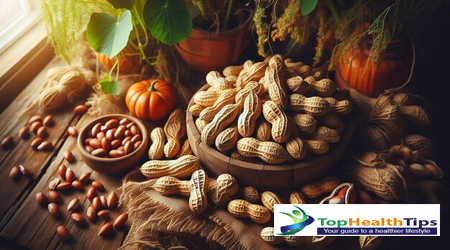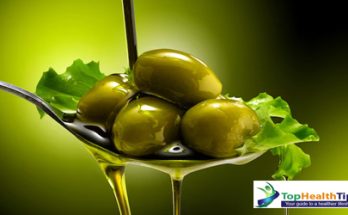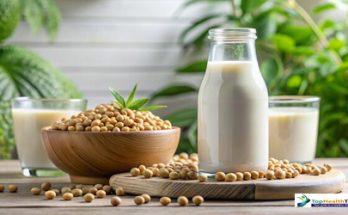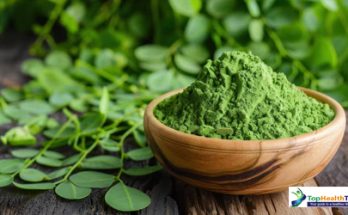Discover the comprehensive health benefits of peanuts, including detailed nutritional insights, potential side effects, and tips for incorporating them into your diet. Learn how peanuts compare to other nuts, the best times to eat them, and who should avoid them.
Nutritional Insights of Peanuts
Peanuts are nutrient-dense and packed with several essential nutrients. Here’s a closer look at their nutritional profile:
- Protein: Peanuts contain about 7 grams of protein per ounce (28 grams), making them an excellent source of plant-based protein.
- Healthy Fats: They are rich in monounsaturated fats (49%) and polyunsaturated fats (33%), which support heart health.
- Fiber: Peanuts offer about 2.4 grams of dietary fiber per ounce, aiding in digestion and satiety.
- Vitamins and Minerals: They are a good source of vitamin E , niacin , folate , magnesium , phosphorus , and potassium.
Nutritional Chart
Nutritional Value of Peanuts (per 100 grams)
| Nutrient | Amount | % Daily Value |
|---|---|---|
| Calories | 567 kcal | 28% |
| Protein | 25.8 grams | 52% |
| Total Fat | 49.2 grams | 75% |
| – Saturated Fat | 6.6 grams | 33% |
| – Monounsaturated Fat | 24.4 grams | – |
| – Polyunsaturated Fat | 15.6 grams | – |
| Cholesterol | 0 mg | 0% |
| Carbohydrates | 16.1 grams | 5% |
| – Dietary Fiber | 8.5 grams | 30% |
| – Sugars | 4.7 grams | – |
| Vitamin E | 8.33 mg | 55% |
| Niacin (Vitamin B3) | 12.07 mg | 76% |
| Folate (Vitamin B9) | 240 mcg | 60% |
| Pantothenic Acid (Vitamin B5) | 1.76 mg | 35% |
| Riboflavin (Vitamin B2) | 0.14 mg | 10% |
| Thiamine (Vitamin B1) | 0.64 mg | 53% |
| Vitamin B6 | 0.35 mg | 27% |
| Vitamin C | 0.0 mg | 0% |
| Vitamin A | 0 IU | 0% |
| Magnesium | 168 mg | 42% |
| Phosphorus | 376 mg | 30% |
| Potassium | 705 mg | 20% |
| Calcium | 92 mg | 9% |
| Iron | 4.58 mg | 25% |
| Zinc | 3.27 mg | 22% |

Health Benefits of Peanuts
Peanuts offer numerous health benefits that contribute to overall well-being. Here’s how they positively impact different aspects of health:
1. Supports Heart Health
- Cholesterol Management: The monounsaturated fats in peanuts help lower LDL (bad) cholesterol and raise HDL (good) cholesterol. Studies show that regular consumption of peanuts can reduce the risk of heart disease by improving lipid profiles.
- Antioxidants: Peanuts contain antioxidants such as resveratrol and flavonoids that protect the heart by reducing oxidative stress and inflammation.
2. Aids in Weight Management
- Satiety: Peanuts’ combination of protein, fiber, and healthy fats helps increase satiety and reduce overall calorie intake. Research indicates that including peanuts in a diet can aid in weight loss and weight management.
- Metabolic Rate: The high protein content in peanuts can boost metabolism, helping the body burn more calories even at rest.
3. Improves Digestive Health
- Fiber Benefits: Dietary fiber in peanuts promotes healthy digestion and prevents constipation by adding bulk to the stool and facilitating regular bowel movements.
- Gut Health: Peanuts support beneficial gut bacteria, contributing to improved gut health and overall digestive function.
4. Boosts Brain Health
- Nutrient-Rich: Peanuts are rich in vitamin E and niacin, which are essential for cognitive function and protecting the brain from oxidative damage.
- Neuroprotection: The antioxidants in peanuts help protect brain cells from damage and may reduce the risk of neurodegenerative diseases.
Harmful Effects and Side Effects of Excessive Peanut Consumption
While peanuts are nutritious, consuming them in excess can lead to some negative effects:
- Allergic Reactions: Peanuts are a common allergen and can cause severe allergic reactions in susceptible individuals. Symptoms include hives, swelling, and anaphylaxis.
- Weight Gain: Due to their high-calorie content, overeating peanuts can contribute to weight gain if not consumed in moderation.
- Digestive Issues: Excessive intake may lead to digestive discomfort such as bloating or gas due to high fiber content.
- Aflatoxins: Peanuts can be contaminated with aflatoxins, a type of mold that can be harmful in large amounts. Proper storage and handling can reduce this risk.
Comparison with Other Nuts
Peanuts are often compared to other nuts like almonds, walnuts, and cashews. Here’s how they stack up:
- Almonds: Higher in calcium and vitamin E but lower in protein compared to peanuts.
- Walnuts: Rich in omega-3 fatty acids, whereas peanuts are higher in protein.
- Cashews: Higher in copper and iron but have a lower fiber content than peanuts.
Best Times to Eat Peanuts
- As a Snack: Peanuts make a great mid-morning or afternoon snack, helping to curb hunger and provide energy.
- Post-Workout: Consuming peanuts after exercise can help replenish protein and aid in muscle recovery.
Who Should Avoid Peanuts
- Allergy Sufferers: Individuals with peanut allergies should avoid peanuts and peanut products entirely.
- Individuals with Certain Digestive Disorders: People with digestive issues such as irritable bowel syndrome (IBS) may need to limit peanut intake due to high fiber content.

Common Tips for Eating Peanuts
- Moderation: Enjoy peanuts in moderation to avoid excess calorie intake.
- Choose Natural: Opt for unsalted and unflavored peanuts to avoid added sodium and sugars.
- Combine with Other Foods: Pair peanuts with fruits or vegetables for a balanced snack.
- Use in Recipes: Incorporate peanuts into salads, smoothies, or stir-fries for added crunch and nutrition.
- Storage: Store peanuts in an airtight container to keep them fresh and prevent rancidity.
- Variety: Try different forms of peanuts, such as raw, roasted, or in nut butter, to add variety to your diet.
- Watch Portion Sizes: Stick to recommended serving sizes to manage calorie intake.
- Check for Allergies: Be aware of any potential allergic reactions and consult a healthcare provider if necessary.
- Include in Balanced Meals: Integrate peanuts into meals that include a variety of other nutrients.
- Avoid Overcooking: Overcooked peanuts can lose their nutritional value and taste.
Conclusion
Peanuts offer a multitude of health benefits, from supporting heart health and aiding in weight management to improving digestive and brain function. Their rich nutritional profile, including essential proteins, healthy fats, and fiber, makes them a valuable addition to a balanced diet. However, it’s important to consume peanuts in moderation to avoid potential side effects and manage calorie intake. By understanding the best times to eat peanuts, who should avoid them, and how they compare to other nuts, you can make informed choices that enhance your overall well-being. Incorporate peanuts thoughtfully into your diet to enjoy their numerous benefits while maintaining a healthy lifestyle.
Related post for nutrition & food>>>
References
- Harvard T.H. Chan School of Public Health – Nuts and Your Health
- Mayo Clinic – Peanuts: Nutrition and Health Benefits
- American Heart Association – Nuts and Your Heart
- National Institute of Allergy and Infectious Diseases – Peanut Allergy
- Journal of Nutrition – Effects of Peanuts on Health
- USDA Nutrient Database – Peanuts




